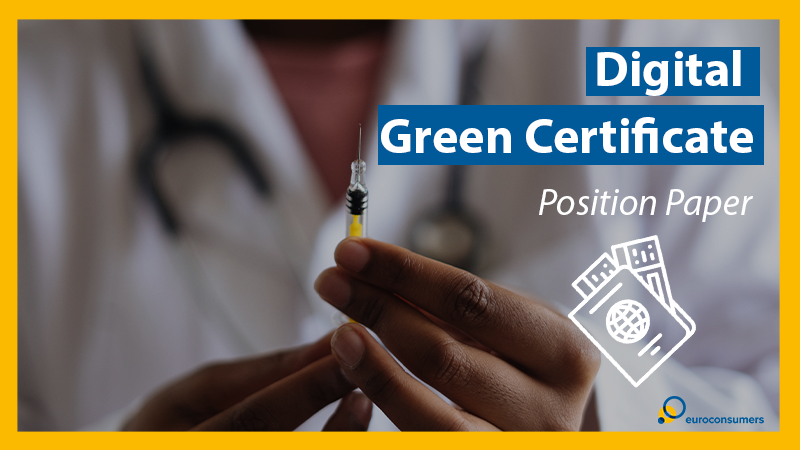This website uses cookies so that we can provide you with the best user experience possible. Cookie information is stored in your browser and performs functions such as recognising you when you return to our website and helping our team to understand which sections of the website you find most interesting and useful.
Euroconsumers calls for travel restrictions to be non-discriminatory, coordinated and proportionate.

The Digital Green Certificate is an important step forward to regaining our EU right to free
movement
Euroconsumers commends the fact that the proposed Certificate is not only based on proof of vaccination, but also includes the alternative options of a negative test or having recovered from COVID-19. This is particularly important given the current low level of vaccination in the different EU countries and the lack of perspective that every EU citizen will indeed have the
opportunity to be vaccinated in the very near future. Euroconsumers also salutes the commitment to strictly respect data protection rules and to ensure a high level of security
against the hacking of what is sensitive personal data. Also the option to provide the Certificate digitally or on paper is much appreciated as a crucial inclusive measure.
Real non-discrimination requires free of charge testing
Getting a test in order to obtain a Digital Green Certificate and be able to travel is not necessarily free of charge. This creates a situation where some citizens can travel ‘for free’ being vaccinated, while others have to pay several hundreds of euros for tests just to be allowed to take a family trip. To avoid this additional layer of discrimination, Euroconsumers insists all necessary tests are offered at no cost. At the very least this should be the case as long as not everyone has been granted the opportunity to get vaccinated. This would otherwise create unequal rights to travel between citizens who got vaccinated on
public expense and citizens who had to pay for their test.
No additional unilateral requirements on top of the Certificate
While with the Digital Green Certificate the European Commission has proposed a facilitating tool, it depends largely on the willingness of the European Member States to turn it into an effective and non-discriminatory way to travel again across Europe.
That’s why Euroconsumers calls on Member States to make good use of the Digital Green Certificate despite its voluntary character and ensure citizens benefit from the same conditions to enter Member States all over Europe, regardless of whether the Certificate was issued on the basis of vaccination, a negative test, or proof of COVID-19 recovery.
This also implies Member States should absolutely refrain from adding unilateral requirements, such as extra quarantines or extra tests, on top of the Digital Green Certificate as this would weaken its effectiveness. The limited cases in which such extra requirements might be considered should be on the basis of strong scientific advice and in any case without any discrimination against citizens who have not been vaccinated (yet).
It is therefore paramount that the European Commission and Member States strive to reopen borders together in the most aligned and effective way possible, avoiding situations in which citizens travelling across several Member States need to comply with different measures.
Euroconsumers would also like to call on Member States to pave the way for a smooth implementation of the Certificate. To that regard Member States should be ready to face the administrative bottlenecks that citizens might encounter when requesting a Certificate so as to ensure the success of the measure.
Travel restrictions can only be temporary and should be constantly reevaluated
Last but not least, Euroconsumers would like to recall that restrictions to free movement can only be tolerated as far as they are necessary, effective, proportionate and temporary. It is therefore of outmost importance that the requirement to show a Digital Green Certificate in order to cross a border is constantly reevaluated against the evolution of the sanitary situation.
Find the .pdf version of the position paper here.


